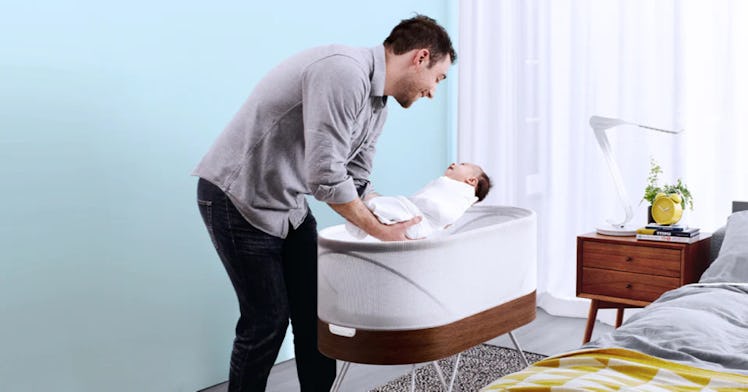The Snoo Smart Bassinet Won FDA Approval. That's A Huge Deal.
The Happiest Baby’s Snoo Smart Sleeper Bassinet has been able to achieve something no other baby sleeping product has been able to.

On March 31, the Food and Drug Administration (FDA) granted the Happiest Baby’s Snoo Smart Sleeper De Novo approval for its ability to keep sleeping babies safely positioned on their backs. This FDA approval makes it the first and only product of this type — a product designed to keep babies asleep on their backs — granted this approval classification.
Placing babies to sleep on their backs is a strong recommendation from the American Academy of Pediatrics to reduce sleep-related deaths in babies, including Sudden Infant Death Syndrome (SIDS), a term used to describe the sudden and unexpected death of a baby less than 1-year-old. SIDS deaths often occur during sleep or in the baby’s sleep area.
However, it’s important to note that this FDA approval does not mean that the product will reduce the incidence of SIDs. Right now, the FDA says the Snoo “has not directly demonstrated a reduction in the incidence of SIDS/SUID.”
The Snoo receiving De Novo approval from the FDA now means it’s classified as a Class II medical device, opening the door for the $1,500+ bassinet to be potentially covered by insurance companies, increasing its access to parents, and potentially helping to stem the crisis of 3,400 babies dying from SIDS each year in the U.S.
What Is the Snoo Sleeper?
The Snoo Sleeper, which hit the market in 2016, has many interesting features that make naptime and bedtime easier for babies and their parents. It’s a smart crib, so it’s designed to respond to the sleeping baby if they wake, start crying, or seem restless.
The crib can respond to babies using a combination of motion, sound, and swaddling to simulate the environment of the womb and prevent babies from being able to roll onto their stomachs, keeping them safely on their backs.
For many parents, the product is a godsend, but a pricey one at that. The crib is $1,500 or, to rent, $159 a month — making it essentially a luxury good that you only use for six months, because it’s only designed for babies up to 6 months old.
Does the Snoo Help Prevent SIDS?
One of the most significant sleep recommendations to reduce the risk of SIDS is to always put babies to sleep on their backs and to prevent them from rolling over before they’re independent enough to roll over on their own.
That’s the feature of the Snoo that led to its FDA approval. The product safely secures babies on their backs during sleep.
"The SNOO Smart Sleeper bassinet plus the Snoo Sleep Sack are jointly intended to facilitate a supine position during sleep,” the FDA grant reads, according to a press release. “The SNOO is demonstrated to facilitate a supine position during sleep.”
The product is not, however, linked with a reduction in the incidence of SIDS, the FDA states.
What Could This Approval Financially Mean for Parents?
Parents want the Snoo, but the Snoo is pricey. It’s not cheap to get all the bells and whistles the Snoo offers to help ease babies into sleep and keep them dreaming peacefully.
The new De Novo approval could mean the sleeper is, in the future, less of a luxury for tired parents who can afford the price tag to buy or rent one, and more of a medical device, similar to breast pumps, that could be partially or entirely covered by insurance. This could increase access to the product.
The ABCs of Safe Infant Sleep
It’s important that parents follow sleep guidelines to keep their babies safe while they sleep. The ABCs of safe infant sleep recommend that babies always sleep alone, on their backs, and in their cribs.
Other guidelines include the following:
- Place baby on their back while sleeping, including all naps.
- A baby's mattress should always be firm and with no incline.
- Keep baby's crib or bassinet free from bumpers, toys, blankets, and pillows.
- Baby should always sleep in their own bed (crib, bassinet).
- Keep your baby's sleep area in the same room where you sleep.
To read the full FDA De Novo approval, visit happiestbaby.com.